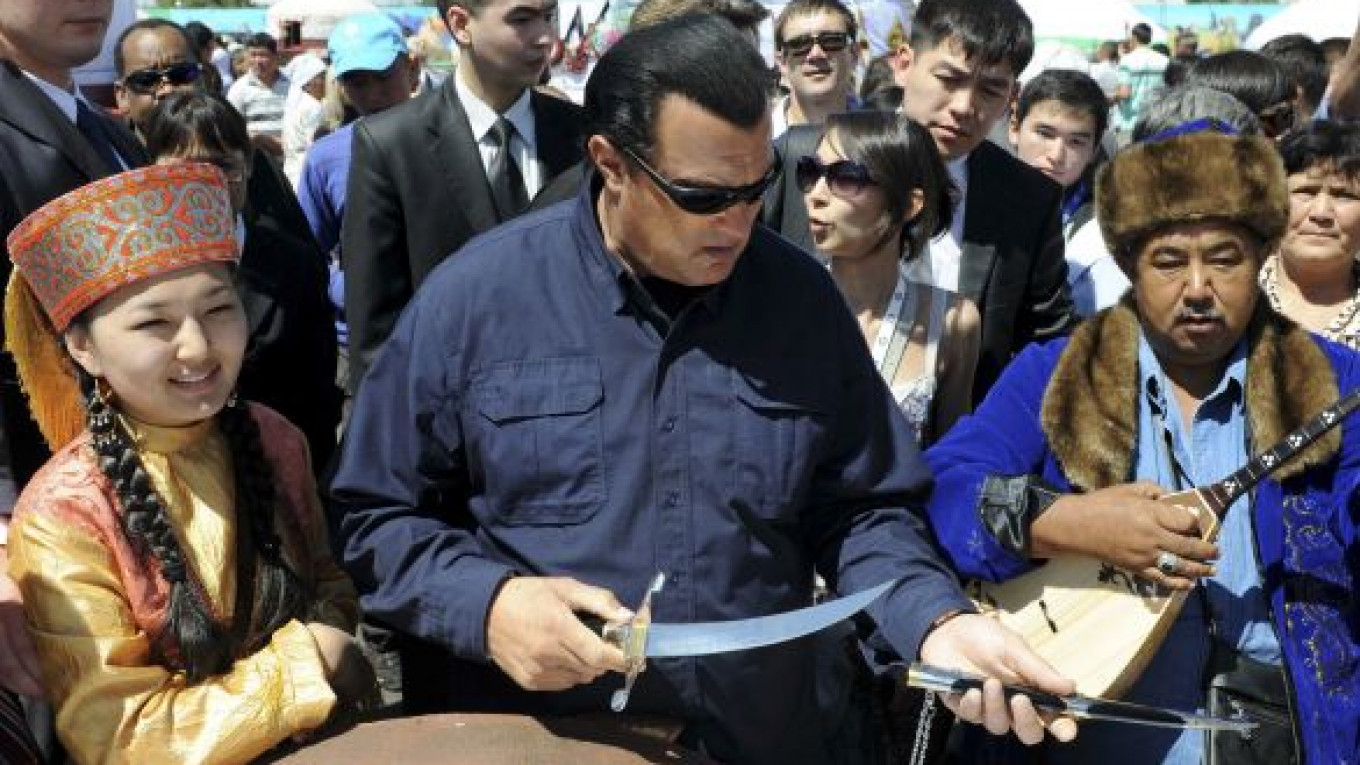ASTANA, Kazakhstan — Kazakh President Nursultan Nazarbayev's brief trip abroad for medical reasons has reminded investors of the biggest uncertainty they face doing business in Central Asia's biggest economy: Who will eventually succeed him?
Nazarbayev, 71, appeared to quell a behind-the-scenes struggle for influence in the oil-producing state by calling and winning a snap election in April. The landslide victory secured five more years in power and was largely welcomed by investors.
Then came an unsourced report in German tabloid Bild that Nazarbayev underwent prostate surgery in Hamburg this month. With the presidential office saying only that Nazarbayev was on vacation, it was left to his close adviser to break the silence.
"He is full of strength and energy and this [the succession] is a closed question until December 2016," Yermukhamet Yertysbayev said by telephone on Tuesday, only 30 minutes after meeting with Nazarbayev in the presidential palace.
Yertysbayev, renowned in Kazakhstan for floating ideas to gauge public reaction, had said the same thing in an interview published Monday.
Nazarbayev hosted a meeting last Thursday with Prime Minister Karim Masimov and several Cabinet ministers, the presidential web site, akorda.kz, reported. It had said on July 11 that the president was on a "short vacation," giving no further detail. He was pictured on the Internet and appeared on television.
Yertysbayev confirmed that Nazarbayev was abroad for a planned medical screening, something he does routinely every year in addition to a separate checkup at home. He did not say Nazarbayev was ill.
Perhaps more tellingly, he also mentioned Timur Kulibayev.
Kulibayev, 44, is the billionaire husband of Nazarbayev's middle daughter, Dinara. A shrewd businessman who rarely speaks in public, he is chairman of several major, state-owned resource companies, including oil and gas giant KazMunaiGas.
Yertysbayev named Kulibayev as the person he believed most likely to continue the course set over the last two decades by the only leader independent Kazakhstan has known.
He insisted that he did not name Kulibayev as a "successor," saying: "We were talking about force majeure. In a force majeure situation, I would consider Kulibayev's candidacy acceptable."
He added: "I'm not the first to say this. It's simply that my surname is Yertysbayev and, if Yertysbayev says something, then it kicks up an unimaginable storm."
Uncertainty is the key risk in the eyes of foreign investors who have pumped more than $120 billion into Kazakhstan.
Renewed succession talk sent the cost of insuring exposure to Kazakh assets higher.
Kulibayev was placed in charge of about $80 billion worth of assets when Nazarbayev appointed him head of sovereign wealth fund Samruk-Kazyna shortly after the election. He is also a board member at Gazprom.
In a rare statement issued late Monday, Kulibayev himself played down any talk of his political ambitions.
"I concern myself with economic issues and business development, and I like this. I have never positioned myself as a politician," Kulibayev said in the statement published by the wealth fund on its web site, samruk-kazyna.kz.
"Nursultan Abishevich won presidential elections in April. It's improper to be discussing the question of a successor now," he said, using the president's name and patronymic.
His emphasis on the economy echoes Nazarbayev's long-stated prioritization of economic growth over democracy in a country holding 3 percent of the world's oil reserves. Per capita gross domestic product has grown 12-fold since 2004.
But Alexander Knyazev, a Central Asia analyst and senior researcher at the Moscow Institute of Oriental Studies, said he thought Kulibayev would prefer to play a background role that would allow him to maintain his many business interests.
"I believe he would prefer … to promote a figure who could eventually replace Nazarbayev and be under his influence, while keeping all his current positions," Knyazev said.
Kulibayev would not assume the presidency should the president leave office unexpectedly. The post would instead pass to the senate speaker, currently former Prosecutor General Kairat Mami, for the rest of the existing presidential term.
Arkady Dubnov, a Moscow-based expert on Central Asia, said any move by the president to include Kulibayev among the 15 senators that he is entitled to appoint to the 47-seat chamber would provide a strong clue to his plans.
But for now, Nazarbayev appears set to continue in charge.
"I don't see any readiness to hand over power right now," said Almaty-based political analyst Aidos Sarym. "The president is alright. He has firm views of his own and is willing to rule this country."
Yertysbayev's comments were probably the latest attempt to gauge opinion after Nazarbayev's medical leave, Knyazev said. "The issue of Nazarbayev's successor has not been solved in any way," he said. "I believe this is still a conundrum."
A Message from The Moscow Times:
Dear readers,
We are facing unprecedented challenges. Russia's Prosecutor General's Office has designated The Moscow Times as an "undesirable" organization, criminalizing our work and putting our staff at risk of prosecution. This follows our earlier unjust labeling as a "foreign agent."
These actions are direct attempts to silence independent journalism in Russia. The authorities claim our work "discredits the decisions of the Russian leadership." We see things differently: we strive to provide accurate, unbiased reporting on Russia.
We, the journalists of The Moscow Times, refuse to be silenced. But to continue our work, we need your help.
Your support, no matter how small, makes a world of difference. If you can, please support us monthly starting from just $2. It's quick to set up, and every contribution makes a significant impact.
By supporting The Moscow Times, you're defending open, independent journalism in the face of repression. Thank you for standing with us.
Remind me later.






